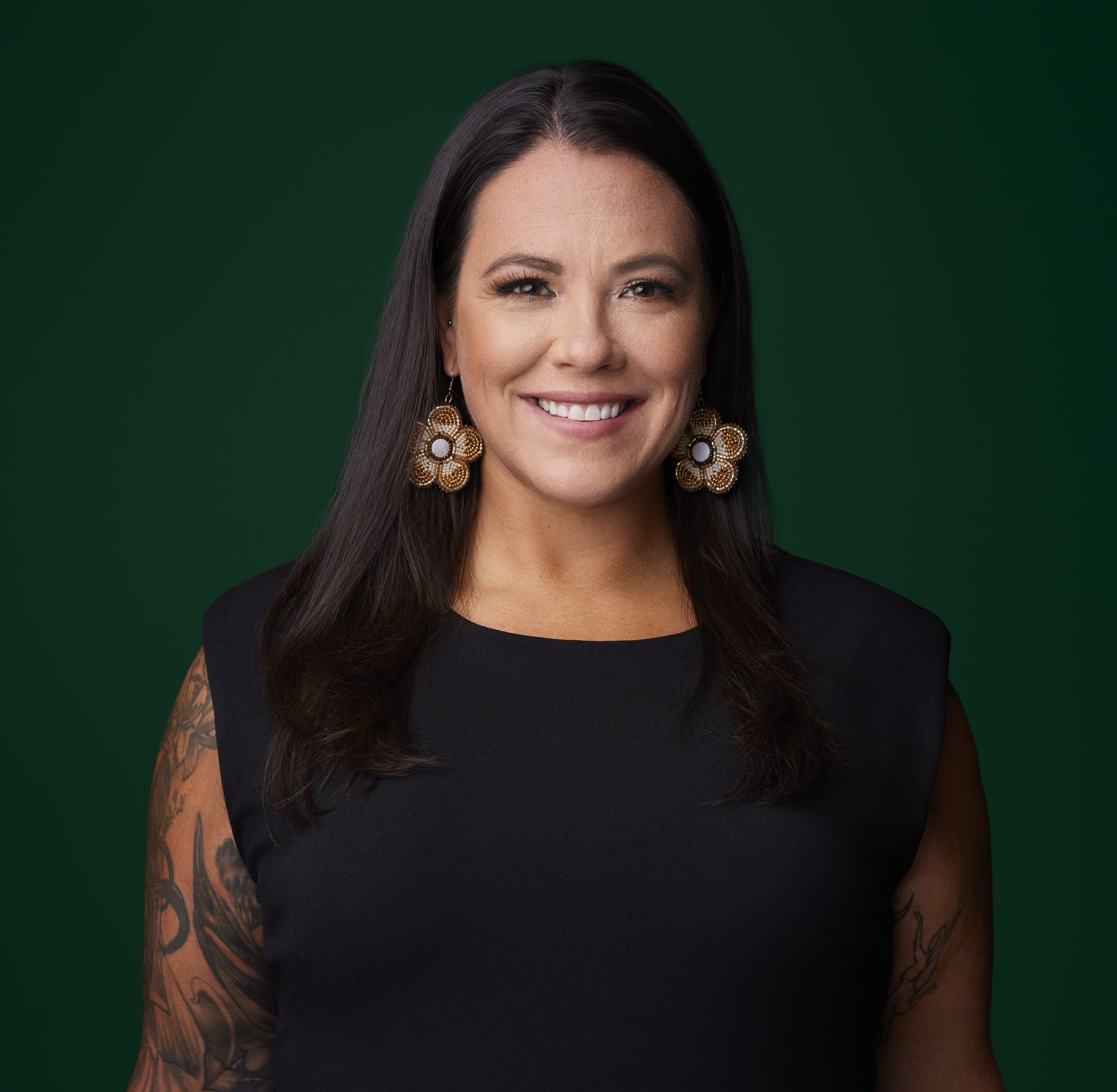Nursing alumna Reagan Bartel receives University of Alberta Alumni Honour Award
25 October 2023

Reagan Mary Bartel
Reagan Bartel became a nurse because of her desire to help people. This desire has moved her beyond in-hospital critical care to advocacy and policymaking. Even before her formal educational and career journey began, she was influenced by the nurses in her community and in her own family.
After more than a decade working in hospital as a critical care nurse at the Royal Alexandra Hospital in amiskwacîwâskahikan (ᐊᒥᐢᑿᒌᐚᐢᑲᐦᐃᑲᐣ), more commonly known as Edmonton, Bartel pursued a master’s degree in public health (MPH) from the U of A. Shortly after completing her graduate program, she became the director of health for the Métis Nation of Alberta (MNA). This role has offered her the opportunity to combine her nursing skills with public health capabilities to lead strength-based health-care initiatives and policy work aimed at addressing health inequities within Métis communities.
We spoke to Bartel about her decision to pursue an MPH, while continuing to think like a nurse in her work and the importance of nurses sticking together.
Why did you choose to become a nurse?
I know it sounds cliché, but I always wanted to help people. I had some incredible nurse role models in my family, too. I saw first-hand how my aunt Sharon made a difference to people in her work as a nurse. Whether in the hospital, or with family and friends, nurses were always the ones that were visible to us in health-care settings.
I also knew a career in nursing would give me different paths in my career so I wouldn’t be pigeonholed. Look at my younger sister, Robyn (Innes) Schroedl and me; she works in rural maternity and emergency care, and I was in critical care and now policy and program development. Nursing offers so many different opportunities.
What led you to pursue a master’s degree in public health?
Recognizing nurses as leaders and advocates led me to the School of Public Health at the U of A. My current role is a marriage between public health and frontline critical care nursing, where I can use my communication, problem-solving, assessment and analytical skills and apply them upstream to make change.
How are you combining your nursing knowledge and skills to support communities?
I explore the unique lived experiences of Métis living in Alberta and use my skills to support self-determined health opportunities that improve outcomes for my own community.
My skills make it possible for me to translate community voices into advocacy, policy and program or service development.
At a program and service-development level, I am proud of the work the MNA did during the pandemic to quickly pull together and offer the first Métis-led COVID vaccine clinic in all of Canada. We had a lot of partners working with us, including many U of A nursing alumni. The MNA also works with the School of Dentistry and its student-led group, Access for All, which aims to improve access to oral health care for underserved communities. I learned the power of interdisciplinary approaches like this from working in-hospital.
In terms of advocacy and policy development, I’m involved in some incredible research, including a community-driven project to understand HPV vaccination within the Métis community. I’m also involved in an ongoing research project, Lii Zaanfaan (The Children), which explores the health status of Métis children in Alberta. At the national level, I contribute to the Métis National Council’s technical health committee, advocating for health equity, systemic policy changes and key priorities related to Métis health. These are just three advocacy projects I’m working on with the MNA; there are many more.
As for advocacy and policy development, I'm working closely with the U of A, assisting the Faculty of Nursing with strategic planning and working with the Faculty of Medicine & Dentistry to investigate how cultural humility and safety can be fostered in medical learners. The MNA is also undertaking anti-Indigenous racism work with an Alberta Health Services researcher affiliated with the U of A.
This work is important in building authentic relationships and is central to ensuring Métis families and individuals have access to a safe medical home.
What words of advice do you have for our future nursing leaders?
This is more a call to action for my nurse colleagues than advice: support First Nations, Métis and Inuit (FN/I/M) peoples. Nurses have the power to hold our system accountable and make change.
Educate yourself. Do the work. Don’t put it all on your Indigenous friends, colleagues or patients. Explore your biases and listen more than you speak. We need to meet people where they are at and that includes a deep understanding of the diversity and historical and contemporary strengths and challenges of Indigenous peoples. Find space to prioritize FN/M/I health needs and knowledge and call out racism where you see it.
Things are challenging right now, but hang in there. If you're thinking you just can’t be at bedside anymore, there is still space for you. I'm an example. I’ve shifted but I'm no less a nurse; I'm just flexing my nurse brain differently.
Reach out to your colleagues for support; talk to them about your dreams and aspirations. That is a role Aunties play in Métis culture, sometimes offering their advice even when you don’t want to hear it! But camaraderie and advice from nurses is second to none.
Look out for, lean on and support each other. We need to continue to do that through these hard times as the health system shifts and as political environments are feisty. We are stronger together.
Get to know other Faculty of Nursing alumni award winner: Dr. Hannah O’Rourke.
Learn more about Reagan Bartel’s Alumni Horizon Award and other U of A alumni award winners here.